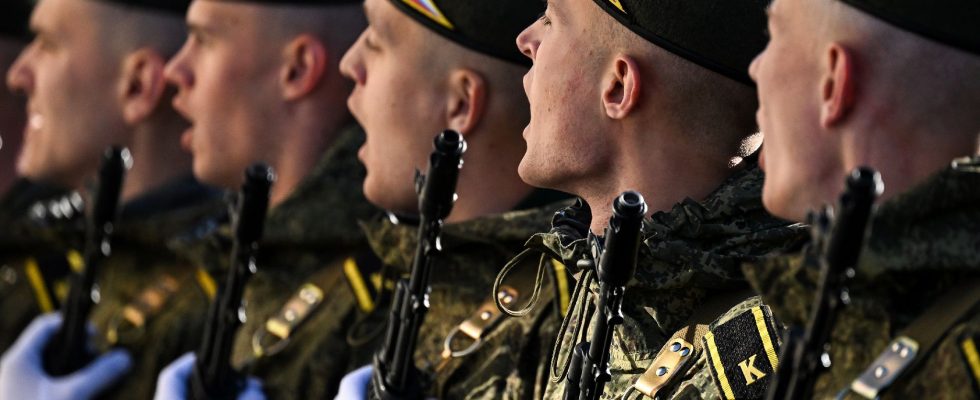The waltz of the generals, within the Russian army, has not finished turning. His latest alleged victim: General Vladimir Seliverstov, commander of the 106th Russian Airborne Division, sacked on July 15, according to multiple Russian sources. In question according to them, the propensity of the senior officer to publicly defend the fate of his troops. Three days earlier, on the 12th, this same reason had already been mentioned by Major-General Ivan Popov, commander of the 58th Russian army, to explain his own sidelining. “I named all the problems that exist today,” he said in an audio message. “Because of this, the ancients probably sensed danger and […] ordered the Minister of Defense to get rid of me.”
These cases, far from being anecdotal, say a lot about the wear and tear of the Russian command after nearly seventeen months of war. And are reminiscent of the disappearance from the radars of General Sergei Surovikin, commander of the Russian aerospace forces, who has not given any sign of life since the abortive mutiny of Yevgueni Prigojine, on June 24. “These cases are symptomatic of the difficulties of the Russian army, which still cannot find a tactical solution in this conflict in which it is bogged down, and where the chain of command appears to be largely demonetized”, points out General (2S) Jérôme Pellistrandi, editor-in-chief of the National Defense Review.
A sign of the times, speculation about the possible ousting of other senior officers has multiplied in recent days on Russian networks. Among other things, the arrest of the commander of the 90th tank division, Ramil Ibatullin, with his two deputies, or the dismissal of the commander of the 7th airborne division, Alexander Kornev, were mentioned.
“We were hit in the back”
A month after the aborted rebellion of the boss of Wagner, this deleterious climate does not help the affairs of the Russian army. “Ultimately, this can lead to a form of paranoia within the forces, where no one will dare to tell the truth for fear of being the next to fall, underlines General Nicolas Richoux, former commander of the 7th Armored Brigade. In his message – and like Wagner’s boss before him – Major General Popov seemed to directly target Russian Chief of Staff Valery Gerasimov. “The Ukrainian forces could not break through our army from the front, but we were hit in the back by our main leader, who cowardly decapitated the army at the most difficult moment,” he denounced, without further details.
Can this pitched battle, between generals of the same camp, have repercussions on the front line? “The apparent crisis in the Russian chain of command and the effects it could have on troop morale will likely degrade Russian capabilities to conduct tactical offensive operations,” gauge in a recent report the Institute for the Study of War, a Washington-based think tank. “The main risk is to increase a phenomenon of passivity and demotivation of the forces engaged on the front, abounds General Pellistrandi. If even the generals begin to have doubts, that does not encourage the soldiers to take risks…”
The delicate replacement of senior officers
Or even worse? After rumors of a possible arrest of the commander of the Russian Airborne Forces (VDV), Mikhail Teplinsky, considered close to Prigojine, soldiers presenting themselves as members of the VDV allegedly, according to a recording released on July 16 by Russian military bloggers, threatened to leave their positions. “This audio, if authentic, constitutes a threat of massive desertion in the face of the enemy, notes the ISW, for whom it could be an attempt to “blackmail the Russian Ministry of Defense in order to ensure that Teplinski continues to command his troops in Ukraine”. There is also, in parallel, the delicate question of the replacement of these senior officers – who, for some, had proven themselves since the start of the Ukrainian counter-offensive, like the 58th army of Major General Popov in the Zaporizhia region.
“If it is a question of replacing them with flatterers who do not come out of the ranks, we do not see how the Russian army could come out unscathed”, points out General Richoux. Witness the many command errors on the Russian side since the start of the conflict, such as the fiasco in February of the attack on Vouhledar, a small town in the Donetsk region, where the Russian forces would have lost, according to the Ukrainian authorities, no less than 130 armored vehicles, including 36 tanks. “Seeing competent officers being withdrawn from the front can only result in a drop in efficiency, continues General Richoux. And this is rather good news for the Ukrainian staff.”
